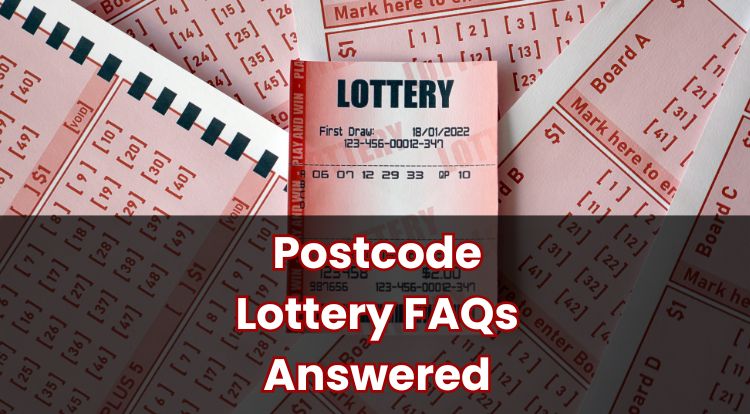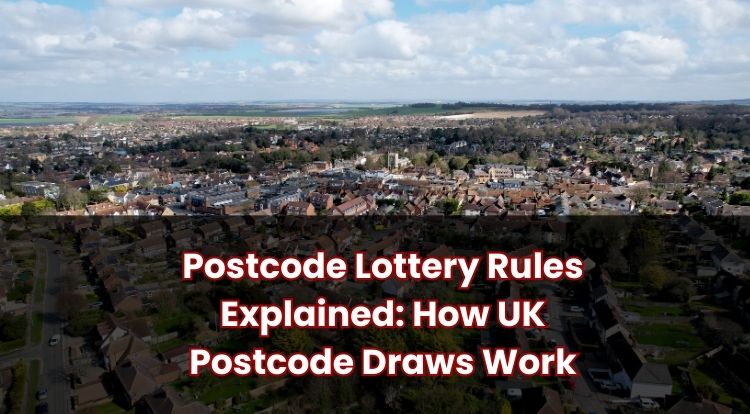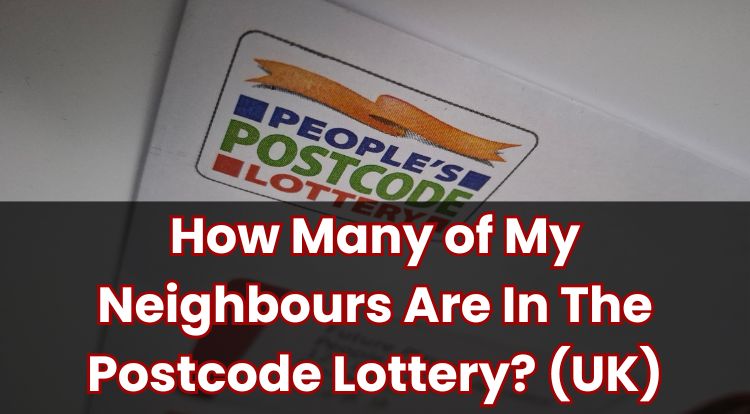Postcode Lottery vs National Lottery: Which Is Better?
Across the UK, millions take part in lottery draws. Two of the most well-known choices are the Postcode Lottery and the National Lottery, each operating in quite different ways.
With so many people playing, familiar questions arise. How do the draws work, and how do prizes reach winners?
This blog post looks at how each lottery operates, how prizes are awarded, how good causes benefit, and whether one might produce more winners. From ticket costs to prize sharing, everything is explained in plain terms to help you make an informed choice if you’re thinking about playing.
What Is the Postcode Lottery?
The Postcode Lottery is a subscription-based lottery available in the UK that links entries to postcodes. Tickets are linked to UK postcodes rather than numbers. When a winning postcode is drawn, all active tickets associated with that postcode share the prize.
The size of an individual payout depends on the total prize for that draw and the number of tickets linked to the winning postcode. Larger postcodes with more tickets may see smaller individual payouts.
A portion of the payments goes to charity and community projects across the UK, and the lottery shares information about the organisations it supports. Players set up a monthly subscription and may hold more than one ticket if they wish.
This model sets the stage for how the National Lottery works differently.
What Is the National Lottery?
The National Lottery has been running for many years and offers multiple games, including Lotto and EuroMillions. Players usually pick numbers and buy tickets either online or from retailers, with draws on specific days each week.
Prizes are awarded according to how many numbers match the draw. Each game has its own setup, so prize amounts and tiers differ. Similar to the Postcode Lottery, part of ticket sales goes to good causes, including arts, sport, heritage, and local community projects.
With formats now outlined, the next step is to see how much it costs to take part.
How Do Ticket Costs Compare?
Ticket charges differ between the two lotteries, which may affect how predictable payments feel.
The Postcode Lottery works via a monthly subscription. Each ticket linked to a postcode costs £12.25, covering all draws during that month.
By contrast, the National Lottery charges per line and per draw. A Lotto line generally costs £2, and EuroMillions is around £2.50 per line. Players may choose to enter a single draw or multiple draws in advance.
Some players appreciate the predictable per-ticket monthly cost of the Postcode Lottery, while others prefer the flexibility of entering individual National Lottery draws with varying numbers of lines. Cost is just one part of the picture; prize distribution is another.
How Are Prizes Funded and Shared?
Both lotteries set aside part of ticket sales for prizes, with the rest supporting good causes and running expenses.
In the National Lottery, each game determines how its prize fund is divided. Lotto and EuroMillions, for example, allocate a defined portion of ticket sales to different prize tiers, with jackpots and smaller prizes awarded to entries that meet the number requirements.
The Postcode Lottery collects monthly ticket sales into a pot, which is then shared among the winning postcodes. Because prizes are divided per ticket within a postcode, areas with more tickets will see the prize shared more widely. For instance, if ten tickets in one postcode win, each ticket receives one tenth of the total prize.
Both lotteries make full prize distribution details available online, so players may review exactly how funds are used before taking part.
Which Lottery Offers Better Odds of Winning?
Odds vary depending on the game and format, so there is no single answer.
For the National Lottery, each game has its own set of chances. In a standard UK Lotto draw (6/59), the odds of winning any prize are roughly 1 in 9.3, while the jackpot odds are about 1 in 45 million. Smaller prizes, such as matching two numbers, make up most wins. EuroMillions has separate odds reflecting the numbers that must match.
The Postcode Lottery depends on the number of tickets in play and the number of prizes available. Since prizes are awarded per postcode and then shared among tickets in that postcode, the likelihood of a potential payout and the amount received might differ by area.
Direct comparison is difficult because the lotteries use different mechanisms. The Postcode Lottery tends to produce smaller, more frequent payouts shared among winners in the same postcode, while the National Lottery has rare but very large jackpots. Anyone deciding between the two should consider the format, the number of draws included, and how often they wish to participate. Odds are one factor, but the size of the top prizes also matters.
What Are the Biggest Jackpot Differences?
Top prizes highlight a key contrast between the lotteries.
National Lottery games may reach very high totals. Lotto jackpots often reach millions, and EuroMillions sometimes exceeds £100 million before hitting a cap and triggering special draws.
Postcode Lottery prizes are typically smaller and shared among all winning tickets in a postcode, so individual payouts are usually lower than National Lottery jackpots, which can reach tens or even hundreds of millions of pounds.
Prize size aside, some players also look at where the money goes and how it benefits communities.
How Do Good Causes Benefit From Each Lottery?
Both lotteries contribute a portion of ticket sales to projects across the UK.
The National Lottery supports arts, sport, heritage, and community programmes, distributing funds through a variety of grants. The Postcode Lottery directs contributions to registered charities and community projects, with regular updates about supported organisations.
Each lottery publishes detailed information on recipients and amounts, allowing players to see the effect of ticket sales on real initiatives.
Which Lottery Has More Winners Across the UK?
The number of winners depends on prize allocation and ticket sales.
National Lottery games have varying structures. Some create many smaller winners weekly, while others focus on fewer, larger awards. Exact numbers fluctuate with sales and rollovers.
The Postcode Lottery produces clusters of winners, as prizes are awarded to all active tickets within a winning postcode. Multiple postcode wins in a period might create a wide spread of payouts across regions.
Both lotteries create regular winners, but the distribution differs. National Lottery games often produce numerous smaller winners alongside rare large jackpots, while the Postcode Lottery awards prizes to all tickets within winning postcodes, creating clusters of winners in specific areas.
Should You Play the Postcode Lottery or the National Lottery?
It comes down to personal preference. A monthly subscription with postcode-based prizes may suit those who prefer community-style payouts. Paying per draw for number-based games may appeal to those interested in larger top prizes.
Both support good causes and provide clear rules on funding and prize distribution. Before taking part, it is sensible to read those rules, compare formats, and set a budget you are comfortable with.
If you choose to play, take part only within amounts you can afford. Set limits on how much you spend and how often you take part, and regularly review these limits to ensure they remain appropriate for you. Remember that playing the lottery should be for entertainment, and it is possible to stop at any time.
Advice and support are available if gambling ever becomes difficult to manage, including through organisations such as GamCare and GambleAware, which provide confidential guidance and tools to help anyone who feels concerned about their gambling.
*All values (Bet Levels, Maximum Wins, etc.) mentioned in relation to these games are subject to change at any time. Game features mentioned may not be available in some jurisdictions.
**The information provided in this blog is intended for educational purposes and should not be construed as betting advice or a guarantee of success. Always gamble responsibly.




